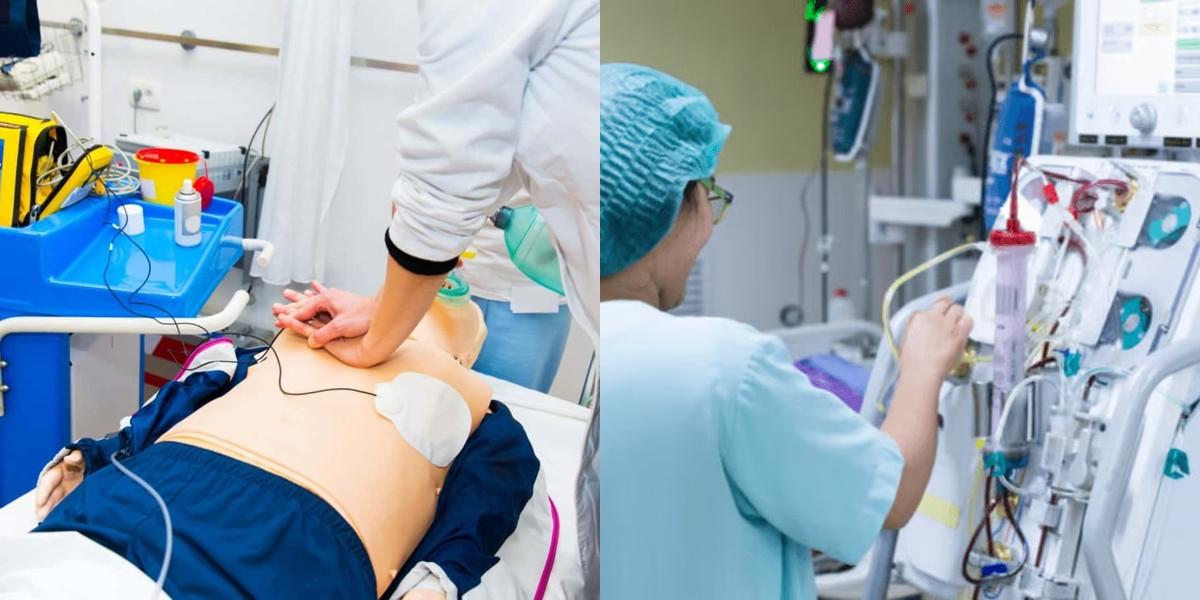ACLS vs Hemodialysis Technician

Want personalized recommendations?
Let's match you to the right program

Key Points:
- ACLS providers specialize in emergency cardiac care, while Hemodialysis Technicians focus on kidney treatment via dialysis.
- Training for ACLS is shorter and centered on life support skills, while Hemodialysis Technician programs are more comprehensive and focus on dialysis operations.
- Career outlook is positive for both, with ACLS providers often earning higher wages due to advanced skills.
Explore the key differences between ACLS providers and Hemodialysis Technicians, from job roles and training to career outlooks. Discover which healthcare path aligns with your goals.
Article continues after recommendations
Recommended for you
ACLS vs Hemodialysis Technician
ACLS and Hemodialysis Technician roles both support critical patient care but focus on different areas. ACLS certifies healthcare providers to respond to cardiac emergencies, while Hemodialysis Technicians specialize in operating dialysis machines to assist patients with kidney failure.
ACLS Provider
ACLS providers are trained in advanced life support techniques to handle cardiac and respiratory emergencies. Their responsibilities include assessing patients, initiating CPR, administering life-saving medications, and coordinating with other healthcare professionals in critical settings like hospitals and emergency rooms.
Hemodialysis Technician
Hemodialysis Technicians operate dialysis machines to support patients with kidney failure. They monitor patients during treatments, ensure dialysis machine functionality, and document vital signs, often working in dialysis centers or hospitals.
Key Differences Between ACLS Providers and Hemodialysis Technicians
Scope of Practice
- ACLS Providers: Manage various emergencies, focusing on life-saving interventions in cardiac and respiratory crises.
- Hemodialysis Technicians: Specialize in kidney treatment, operating dialysis machines to cleanse patients’ blood, focusing on scheduled dialysis care.
Work Environment
- ACLS Providers: Found in high-intensity settings like hospitals and emergency departments, where emergencies demand immediate response.
- Hemodialysis Technicians: Work primarily in dialysis centers or hospitals, maintaining a structured schedule to provide regular treatments for kidney patients.
Patient Population
- ACLS Providers: Treat patients across all ages and conditions, responding to a wide range of medical emergencies.
- Hemodialysis Technicians: Primarily work with adults and older patients with kidney disease requiring regular dialysis.
ACLS vs Hemodialysis Technician: Job Description
ACLS Provider:
- Respond to cardiac and respiratory emergencies.
- Administer medications, perform CPR, and use defibrillators.
- Coordinate with emergency teams to stabilize patients.
Hemodialysis Technician:
- Operate and maintain dialysis machines.
- Monitor patients’ vital signs and ensure their safety during dialysis.
- Record patient data, manage supplies, and ensure the sterile setup of equipment.
Get courses selected just for you
Try our powerful search engine
Education and Training Requirements
ACLS Provider
- Prerequisites: Complete a Basic Life Support (BLS) course.
- Training: Enroll in an ACLS course, which includes classroom instruction, hands-on practice, and a certification exam.
- Certification: Typically requires periodic renewal through refresher courses.
Hemodialysis Technician
- Prerequisites: High school diploma or GED (requirements vary by state).
- Training: Complete a certification program, often at community colleges or vocational schools, covering topics like anatomy, infection control, and dialysis procedures.
- Certification: Pass a state-specific or national certification exam.
ACLS vs Hemodialysis Technician: Career Outlook and Salary
ACLS Provider
- Career Outlook: Positive, with demand for emergency care professionals expected to grow as healthcare facilities seek trained providers to handle cardiac events.
- Salary: Higher than average due to advanced skills; specific earnings vary based on profession, experience, and location.
Hemodialysis Technician
- Career Outlook: Strong, given the aging population and rising incidence of chronic kidney disease.
- Salary: Comparable to healthcare support roles, with potential for higher earnings based on experience and location.
Final Thoughts
Both ACLS providers and Hemodialysis Technicians offer rewarding careers in healthcare, each serving essential patient care roles. ACLS providers thrive in fast-paced, emergency settings, while Hemodialysis Technicians excel in routine, patient-centered environments. Ultimately, the choice depends on your interest in emergency response versus ongoing, specialized care.
Dreambound provides accessible programs across locations. To explore each career path further, visit:
- ACLS in West Virginia
- Hemodialysis Technician in West Virginia
- ACLS classes near you
- Hemodialysis Technician classes near you
Dreambound is here to support your journey into healthcare, helping you make an informed career decision.




